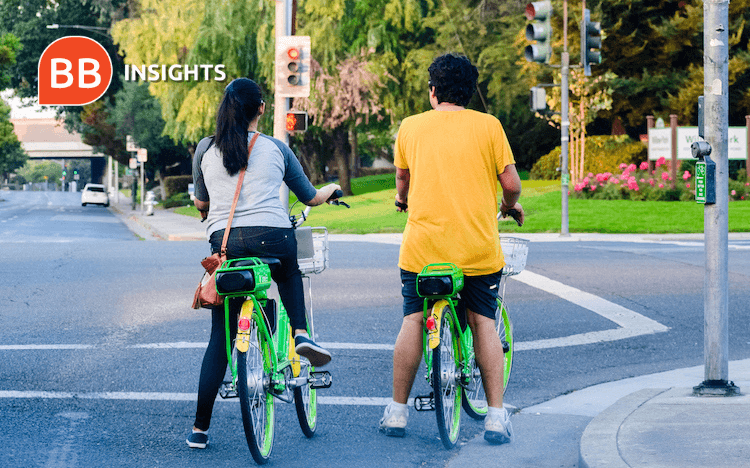Peer-to-peer apps, collaborative consumption—the sharing economy has many faces and many names.
The first reference to the sharing economy grew out of coding, where programmers would contribute to programs to be shared for free. But in the wake of the 2008 financial crash and in the face of the climate crisis, the sharing economy has come to change how we make the most out of limited, costly resources, while minimizing our carbon footprint.
Technology and the sharing economy have transformed our lives, allowing us to tackle problems like high rent and carbon emissions.
Here are five problems that the sharing economy has offered a solution for, and changed the world as a result.
1. Access to public transport
In the push to reduce carbon emissions, car ownership has come under greater scrutiny. But for places where public transport isn’t reliable or available, alternatives are necessary.
The sharing economy has transformed public transport possibilities, both in terms of sustainability but also cost saving. For many, it started at Uber—frustrated at paying $800 for a private hire car on New Year’s Eve, Silicon Valley entrepreneur Garrett Camp was keen to transform and democratise ride hailing.
Uber’s POOL service allows customers to hop into other people’s taxis and share the cost accordingly. In many US cities, it’s almost as cheap as a bus or subway, and reduces emissions from private hire taxis. For those travelling slightly further afield, apps like Croozen, founded by a Chicago Booth MBA, teams up people on roadtrips, halving their emissions and splitting the cost of their journeys.
But Uber’s legacy goes far beyond cars. With sustainability and healthy living overlapping, cycling has been conquered by the sharing economy, with apps like Ofo, Mobike, Lime, and Jump (owned by Uber) bringing their brightly colored contraptions to a street corner near you.
Between 2014 and 2018, the number of public shared bicycles increased from 2.3 million to 18.2 million.
The catch? A desire to gain market share has meant that many bike sharing apps have expanded far too quickly. Mountains of scrapped Ofo bikes have been photographed in countries like China, raising the question about whether the millions of bikes filling our streets are actually being used.
2. High cost of rent and property
As residents in major cities like London and San Francisco can attest to, the rising cost of rent and depleting housing stock is a real issue.
Property sharing offers its own solution, ensuring that no space—from spare rooms to spare couches—goes to waste.
Airbnb, conceived when its founders rented out air mattresses in their San Francisco apartment, has changed the landscape of homeowners and holidaymakers. The ‘hosting’ experience feels as much a lifestyle choice as a financial one—in staying in someone’s spare room, you’ll share the experience of what it’s like to be a local in that city.
This is even truer for innovations like Homestay and CouchSurfing, the latter of which is free.
Even the stresses of homeownership has been alleviated by the sharing economy. Tipi, a property development first established in London, provides a shared living experience, where renters share communal facilities like a gym and a cinema. Meanwhile the nightmares of renting—deposits, utility bills, insurance—is all sorted for you.
The catch? Airbnb has come under great scrutiny for its effects on local economies, namely driving up rent, increasing gentrification, and creating a dependency for residents on renting out their rooms.
3. Food waste
One third of all food—1.3 billion tonnes annually—goes to waste, while 12.9 percent of the world is undernourished. The spectre of food waste looms large.
Food sharing apps are coming up with new, innovative ways of reducing waste on personal to industrial levels.
Take the app Too Good To Go, which allows restaurants to sell off leftover food at highly discounted rates at the end of the day. Or Olio, which connects consumers who are getting rid of stock. For the more adventurous, there’s HomeDine, an opportunity to share a unique culinary experience in the heart of someone’s home.
Before you chuck out that last helping of curry, it’s worth checking out food sharing possibilities.
The catch? The sharing economy has also heralded the arrival of food delivery apps like Uber Eats and Deliveroo. Meals are transported in plastic packaging, meaning while food might not be filling the landfill, the plastic will be.
4. Fast fashion and consumerism
Fast fashion and quick, easy consumerism have skyrocketed in popularity with online shopping. But their rise is footnoted by the impact they’re having on the environment. The fashion industry is believed to contribute to 10% of the world’s carbon emissions; a desire to save money doesn’t give you licence to kill the planet.
Rent The Runway hires out top fashion label clothes on subscription, allowing its customers to try out and return clothing which won’t end up on the scrapheap.
Sites like Neighborrow and Fat Llama apply this same logic to just about any household item, allowing you to rent out anything from speakers to power tools—things you wouldn’t need to buy, and could split the cost by sharing. Freecycle takes this a step further, where you can swap or give away things you have no use for anymore, for free.
The catch? It's been suggested that clothes sharing apps has actually increased the amount of clothing that people are buying, in the knowledge that they'll be able to hire them out online to recoup the money.
5. Access to renewable energy
It’s covered everything food to transport, but what could be the next frontier for the sharing economy? Many expect it to be energy.
The climate crisis has seen a sharp increase in attention on renewable energies, particularly for major corporations. But for the ordinary consumer, installing solar panels or wind turbines in your back garden isn’t feasible—more than anything, they’re very expensive.
But between several households, or small communities, suddenly the cost isn’t so large. Why not apply the same UberPOOL logic to energy?
Brooklyn Microgrid is one of the first examples of this system, where residents can subscribe to locally produced renewable energy. The cost is divided, and excess energy is sold off to energy companies.
Energy sharing is far from being a national, let alone regional, economy; but given impending climate disasters, and the need to cut carbon emissions, it could become the most important innovation of the sharing economy.
The catch? Energy sharing doesn't really seem to have a catch—or perhaps it's too soon to tell. The real challenge will be whether it catches on enough to have an impact, to make renewable energy the norm.
BB Insights explores the latest research and trends from the business school classroom, drawing on the expertise of world-leading professors to inspire and inform current and future leaders
READ MORE: What Is The Sharing Economy?
©prostooleh
Student Reviews
The University of Chicago Booth School of Business
RECAPTHA :
72
43
b9
9e









